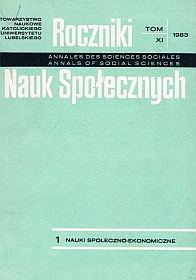The Sociology of Religious Practices in Rural Communities in West Germany
Abstract
The present paper presents a sociological description of religious practices in West Germany on the basis of the materials published during the last several years.
The study of the sociology of religion is characterized by a wide range of empirical, theoretical and methodological analyses. The paper presents also inter- views representative of religiousness of the people, monographic studies in rural religiousness, research in the influence of migration to towns on the religiousness of the migrating people and studies concerning the position of the priest in the village.
During the post-war period the tendency with regard to religious practices is noted as decreasing. It is well seen even in the socially stable parishes in the country. Particulaly, the number of Sunday church-goers is decreasing. The cult practices of the faithful are not identical with the normative pattern. Rural communities, however, preserve a higher level of religious practices than people in the town do. Migrations«to towns has a rather negative influence on the religiousness of the people who leave their villages, but the range of the process is assessed by the psychologicsts not univocally. The rural immigrants to towns do not always represent a higher level of religious practices than people in the towns.
The chaplaincy’s principal problem now is for the Church „to become rooted” in the present all the changing world. The evolution of the people’s church of traditional Christians will lead, as pastoral theologists think, to the creation of the Church of Christian community built by people fully aware of their choice, their religious aims an their faith.
Copyright (c) 1983 Roczniki Nauk Społecznych

This work is licensed under a Creative Commons Attribution-NonCommercial-NoDerivatives 4.0 International License.


